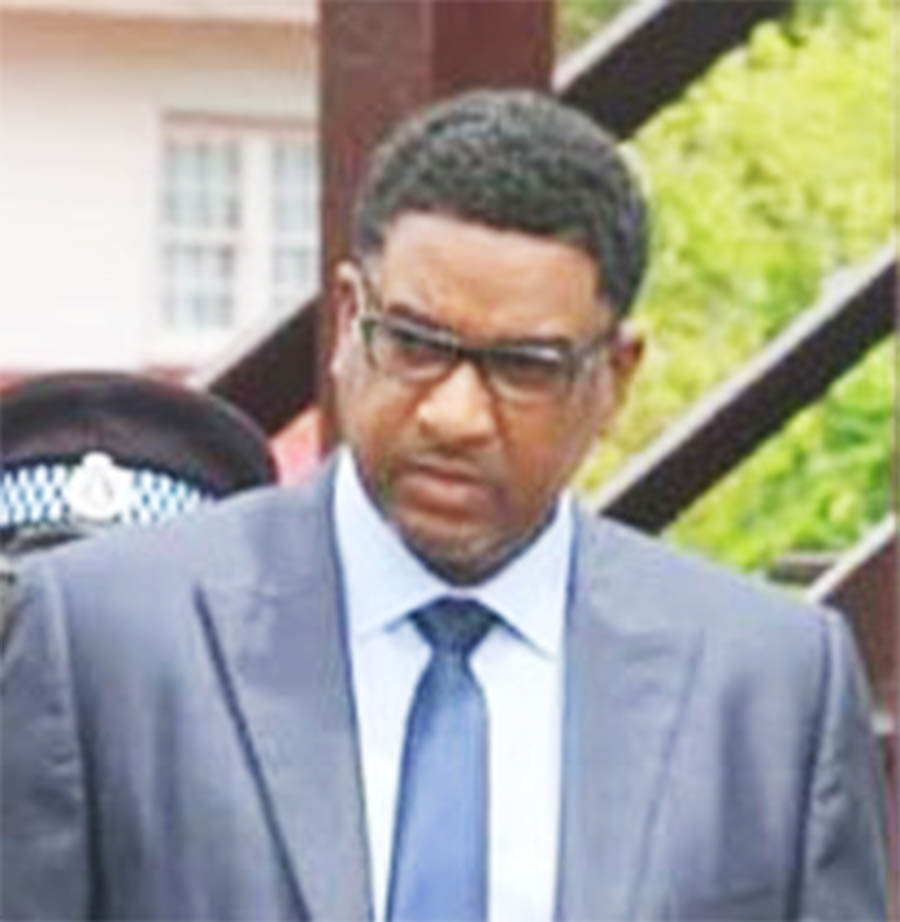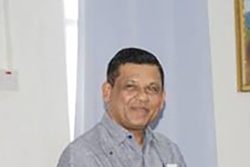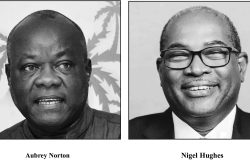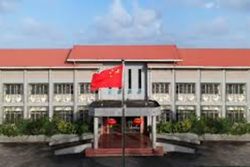Attorney Ryan Crawford and his brother have been denied their attempt at ownership of some 100 acres of land, which they claimed had been given to their deceased father who was a lawyer, by a client in lieu of payment.
High Court Judge Damone Younge in a ruling delivered on Monday, pointed out that the Crawford siblings failed to substantiate their claim that such an agreement had existed between their father and the owner of the land, who they said owed their father legal fees. Highlighting that this was material to their application for declaration of title to the land in dispute, Justice Younge revoked an order made by the Commissioner of Title.
Further, she ordered the brothers to pay $75,000 costs to the son of the owner of the land, who had filed the case against the Crawfords.
Subramannie Madray, in his capacity as administrator of his father’s estate, brought the court action against Curtis Ryan Crawford and Marcel Crawford Jnr. His contention was that contrary to the claim they made, there never existed any right entitling them to any part of his father’s land.
The disputed 100 acres are part of a 577-acre plot located at Op Hoop Van Beter, West Bank Berbice.
Subramannie Madray deposed in his application that in May 2021, he discovered that the Crawford brothers had filed a petition in the Land Court seeking prescriptive title of 100 acres of land. At the same time, he also discovered that back in June 2018, the Commissioner of Title had granted an order declaring that siblings had acquired title to the land.
Subramannie Madray, according to court documents, soon further discovered that the plan to which the respondents’ petition referred did not relate to his father’s Op Hoop Van Beter land, but rather land located at Ulverston, Berbice.
Another discovery made by Subramannie Madray was that his father’s transport pursuant to which the order of the Commissioner of Title had been made, “was altered to reflect that the respondents/defendants had acquired prescriptive title to the land.”
An issue also raised by Subramannie Madray, but which the court later ruled was not a breach of the law, was that the Crawford siblings swore that they had effected service on his father by way of registered post on two occasions – July 5th, 2017 and April 23rd, 2018. He noted that his father had already died 16 years earlier.
Ryan Crawford, who represented himself and brother before the court, sought to advance that their father, Marcel Crawford SC, who had been the attorney for the senior Madray in a matter before the court, had a fee arrangement in which the two agreed that Madray would give their father 100 acres of land in place of owed legal fees.
Ryan Crawford argued that since 1995, Subramannie Madray was aware of the deal their fathers had, and also of the declaration of title being granted in favour of him and his brother. Subramannie Madray refuted those claims.
The brothers accepted that they had no evidence to prove their claims.
They admitted that their petition had not been filed with the plan related to disputed 100 acres, but advanced that it was an error; while adding that it had been corrected during the hearing of the petition.
Ryan Crawford submitted that there never was any attempt by him or his brother to mislead or deceive the court, that it was a mere clerical error, and that the description of the land petitioned for had always been consistent and related to the 100-acre plot.
Through his attorney, Senior Counsel Roysdale Forde, Subramannie Madray contended that the fee arrangement between his father and the older Crawford was void and of no legal effect.
He took issue, too, with the fact that the Crawfords never disclosed to the Land Court judge in their petition, the existence of the purported fee arrangement which he contended amounted to material non-disclosure and/or suppression of material facts.
This, Forde advanced on behalf of his client, ought to result in setting aside the order for the declaration of title.
The issue which needed to be determined, Justice Younge said, was whether the declaration of title granted, needed to be set aside for non-compliance with the procedural requirements of the rules.
Subramannie Madray’s case, as outlined by the judge, was that the petition of the Crawford brothers did not comply with the rules in respect of three main areas: (i) service of the petition, (ii) reference to the plan in the petition and (iii) material non-disclosure.
Regarding the issue of service of the petition, Justice Younge cited Subramannie Madray’s presentation of his father’s death certificate and a copy of the transport for the disputed land; noting on the latter that neither Crawford nor his sons were ever in possession and/or occupation of it.
The judge said, however, that apart from this “bald statement,” Subramannie Madray did not substantiate this claim by any evidence whatsoever.
On the issue of the service of the petition, and referencing a number of case law authorities, Justice Younge said that contrary to Forde’s submission, the rule requiring service did not stipulate that the person on whom service was to be effected must be alive and must personally accept service or if deceased that service was to be effected on the personal representative of his estate.
“Indeed, in this court’s view, such a restrictive interpretation of the rule would stymie many an application for Prescriptive Title if service were only to be effected [on] living persons or representatives of their estate. This could not be the intent of the rule relating to service,” Justice Young said in her written ruling.
Rule 4 of the Rules of the High Court (Declaration of Title), she added, speaks to publication of a notice of the petition in a newspaper and the Gazette. It was clear, she said, that when read together, “the intention is to as far as possible alert any interested person so that he may appear and oppose the petition on the basis of a legal or possessory title.”
Rule 9, she then said, sets out possible methods of service, noting that the practice has built up in the Land Court that such service can be effected by registered post.
In the instant case, she noted, the evidence showed that service of the petition was effected by registered post on the now deceased Madray at places he lived. Against this background, the judge said that the court was satisfied that the necessary rules had been complied with, and therefore, the applicant’s submission that title should be set aside on the ground that service was not effected because his father was already deceased, was rejected.
Regarding the issue of the plan in the petition, Justice Younge said that from the copy of the petition tendered in evidence by the respondents, it was clear that there was an attempt to remedy the error.
In this regard, the court noted its observation of what it said appeared to have been an annotation made by the Commissioner of Title on the petition amending the plan number.
Referencing legal precedent, the judge said she was of the view that the error defect in the petition regarding the plan was not merely procedural and therefore could not be waived even as she added that the annotations, even if made by the Commissioner of Title herself, “were not sufficient to cure the defect” in the petition to bring it into conformity with the rules.
“This is so in light of the fact that notice and service of the petition would have already been done with a plan which does not relate in any way to the land petitioned for. Such a fundamental defect in the petition could not be remedied by simple annotations on the petition itself as was purportedly done,” she said. “The more prudent approach would have been to have an amended petition filed with the correct plan and plan number.”
On the issue of material non-disclosure, Justice Younge noted that like the error regarding the plan, this was fatal to the case for the Crawford siblings.
She said that their failure to mention in their petition the purported fee arrangement, was a breach of Rule 3 which states that “the petition shall contain a statement of all the material facts upon which it is based and describe with particularity the property to which it relates, and state the boundaries, or the nature and extent thereof, as the case may be.”
She said that while the rules do not define “material facts,” it would not be incorrect to say that such facts must be germane to the matter in question.
On this point she said that in petitions for declarations of title, the Commissioner of Title must be apprised of all facts that would possibly have an impact on his/her decision whether to grant or refuse a declaration.
In the instant case, she said that even though Ryan Crawford testified under cross-examination that the purported fee agreement between his father and Madray did not form the basis of his application for prescriptive title for the land in dispute, it was evident from the pleaded case and the evidence adduced that this fee arrangement was in fact the foundation of the Land Court application.
“This fact, in this court’s view, would have been material to the application being considered by the Commissioner of Title. Failure to disclose it therefore offends against Rule 3 (2) of the rules,” the judge said.
A perusal of the petition, she said, showed how devoid of material facts it was. She noted that nothing was said of how the Crawfords came to be in possession of the land petitioned for, or when. She said she was therefore unclear as to how the Commissioner of Title could have come to a determination that the respondents met the requirements of the Title to Land (Prescription and Limitation) Act on the minimal facts pleaded.
Having considered the matter in its entirety, Justice Younge said the court was satisfied that while the respondents met the requirement for service of the petition, they failed to comply with the rules regarding the plan referred to in the petition and material disclosure; holding that “these defects are fundamental and not mere irregularities.”
In light of the determinations made, Justice Younge ordered that the declaration of title made on June 21st, 2018 in the petition be set aside for non-compliance with the Rules of the High Court (Declaration of Title) with costs to the applicant in the sum of $75,000 to be paid no later than May 13th.










